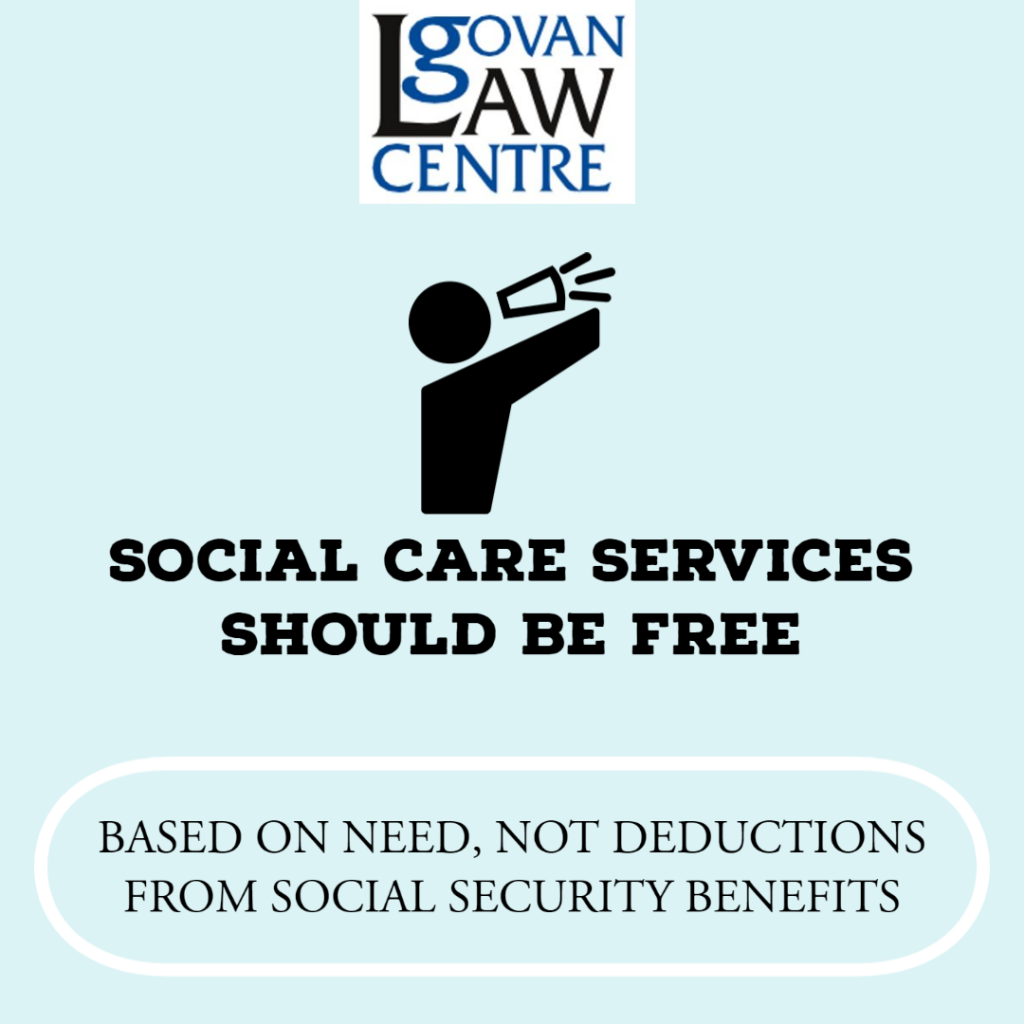BASED ON NEED, NOT DEDUCTIONS FROM SOCIAL SECURITY BENEFITS
NEW LAW CENTRE CAMPAIGN
OVER two years ago the former First Minister pledged to abolish charges for social care if returned to power. Nicola Sturgeon said: “We believe social care services, just like health care services, should be provided on a truly universal basis, free at the point of use”.
In April 2021, Ms Sturgeon explained the justification for scrapping such charges: “The principle that drove us to scrap prescription charges was simple – health care services should be free and based on the care you need, not your ability to pay. That same principle is what drives us to abolish non-residential social care charges for people of all ages. Fundamentally, if for someone’s care they require the care services of things like meals on wheels, community wardens, lunch clubs, supported living assistance or community alarms and laundry – then they should not be charged for them.”
A sound policy rationale, but charges for non-residential care services in Scotland continue with no end in sight. Typical charges result in deductions by a local authority from a person’s social security benefits of £25 to £97 per week.
These fees can be financially painful for people on lower incomes, particularly so in a cost of living crisis. Indeed, many disabled Scots are now being pursued for arrears of social care charges accumulated over the last few years. Social care charges are particularly unfair for people who have extra living costs arising from disabilities.
The 1968 Social Work (Scotland) Act provides the legal basis for charging for social care. Under section 87 of the 1968 Act charges must be both “reasonable and practicable” for an individual to pay.
Following the UK Supreme Court case of McCue v. Glasgow City Council, Glasgow’s charging policy was updated in March this year. It applies an extra disregard for disability related expenditure (DRE) – in other words DRE will reduce the charges a person has to pay for social care services. DRE is narrowly defined in Scotland and includes:
“Additional heating requirements; purchase, maintenance and repair of disability related equipment; specialist dietary requirements; specialist clothing; help with cleaning and other domestic tasks including gardening (if that is something the person would have undertaken themselves); extra washing; and additional bedding”.
DRE in Scotland is essentially regarded as unavoidable living costs arising from a disability. Most councils will reject anything they consider to be “discretionary” spending – such as the cost of attending specialist clubs, services or groups.
DRE is not defined in statute in Scotland, nor does it have any meaningful supporting Scottish Government guidance, unlike the position in England. 2014 English regulations provide a clear definition of DRE (see paragraph 4(2) of schedule 1) which includes, “the costs of any specialist items needed to meet the adult’s disability”.
This month, the High Court in London held that the cost of attending a specialist service could qualify as DRE. The case of RW v. Royal Borough of Windsor and Maidenhead concerned a young man in his twenties diagnosed with autism. He attended a social and life skills group which cost £15 per session for support with social and life skills which helped with his autism and care needs. His local council refused to treat this cost as DRE as it was “discretionary”.
The English High Court disagreed and found that the activities fell within the statutory scope of DRE. Attending the life skills group was also consistent with the United Nations Convention on the Rights of Persons with Disabilities.
Until we abolish social care charges, the Scottish Parliament should ensure that disabled persons in Scotland are not disadvantaged. At present disabled persons in England have more rights because DRE has a statutory basis with progressive statutory guidance.
As an interim measure, Govan Law Centre (GLC) is calling upon the Scottish Ministers to introduce equivalent English law protection on DRE by issuing statutory directions and guidance to local authorities in the exercise of their social care functions. They have the power to do so under section 5 of the Social Work (Scotland) 1968 Act.
Such directions and guidance could provide a more comprehensive and inclusive definition of DRE consistent with the progressive approach taken in English law. There is an urgent need to do so given the ongoing cost of living crisis.
GLC appreciates that this law reform proposal would result in a reduction in social care charges for disabled persons in Scotland which would necessitate additional funding from Scottish Government for local authorities.
GLC has written to the Minister for Social Care, Maree Todd MSP to request that the Scottish Government give consideration to this proposal to ensure that disabled Scots have access to the same rights on DRE as disabled persons in England. GLC has also written to the Convenor of the Scottish Parliament’s Health, Social Care and Sport Committee to ask whether the Committee can consider this proposal to remove legal disadvantages on DRE for disabled Scots.
GLC will be working with carer’s groups, disability rights organisations, trade unions and wider civic groups to build wider, cross-party support for this proposal.

